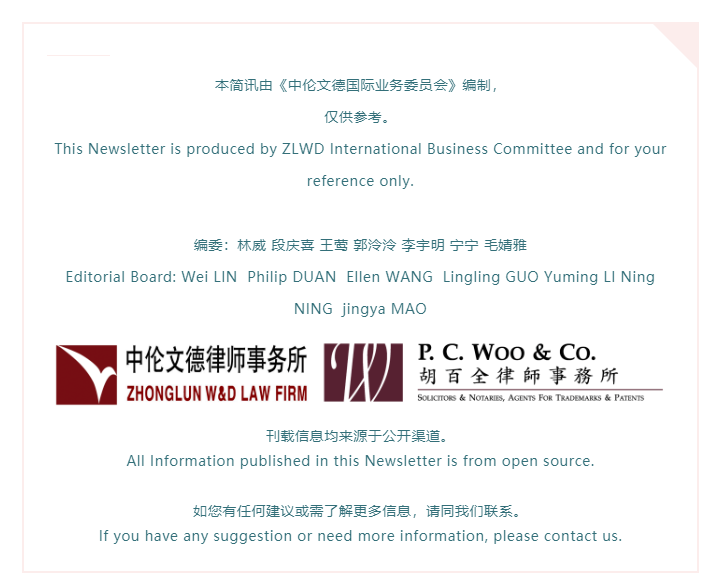
NEWS

NEWS

Shenzhen International Arbitration Institute Joins the United Nations Commission on International Trade Law as an Official Institutional Observer
Recently, the Shenzhen International Arbitration Institute (also known as the South China International Economic and Trade Arbitration Commission and the Guangdong-Hong Kong-Macao Greater Bay Area International Arbitration Center, or SCIA for short) joined the United Nations Commission on International Trade Law (UNCITRAL) as an official institutional observer in Working Groups II (Dispute Resolution) and IV (Electronic Commerce), and will participate in Working Group III (Investor-State Dispute Settlement Reform) as a temporary observer in international exchanges and practical seminars. UNCITRAL has established six working groups to undertake substantive preparatory work on topics in the Commission's work plan, each consisting of all member States of the Commission.
In the future, through active participation in the formulation of international trade and economic law rules, SCIA will convey the "Chinese voice" of international arbitration, provide useful opinions and suggestions on commercial legislation in the fields of international commercial dispute resolution, international investment dispute resolution and e-commerce, and make contributions to the improvement of the international business environment.
Yunnan Free Trade Zone Kunming Area: Innovative Commercial Arbitration and Mediation Model
In order to actively promote the construction of "international legal service complex" in Kunming Free Trade Zone (FTZ), on May 11, the China Governance Management Centre of Kunming FTZ signed a Memorandum of Strategic Cooperation with Hong Kong International Commercial Arbitration Centre and Bishkek International Commercial and Energy Arbitration Court to innovate the supply mode of commercial arbitration and mediation services in FTZ.
This strategic cooperation agreement signed by the three parties will be based on the principles of resource sharing, complementary advantages, and cooperation, giving full play to their respective channels and resources in international arbitration services, as well as years of experience and expertise in legal and cross-border dispute resolution services. The three parties will work together to promote the "international legal service complex" and "eight cross-border" cooperation in the Kunming Area of the Free Trade Zone and strive to provide quality and efficient cross-border dispute resolution services for international commercial entities in their respective countries or regions and countries along the "Belt and Road".
The Bishkek Court of International Commercial and Energy Arbitration is the only permanent international arbitration institution in the Shanghai Cooperation Organization and Central Asia, mainly engaged in international commercial and energy dispute resolution, using its professional advantages in the fields of investment, energy, and international dispute resolution. It has been committed to providing quality international arbitration services to Chinese enterprises investing and starting up in Central Asia and Russian-speaking countries.
China (Yunnan) Pilot Free Trade Zone is an important node for the construction of a large channel connecting South and Southeast Asia. Kunming Free Trade Zone is the core area of Yunnan Free Trade Zone. Kunming City attaches great importance to the construction of "international legal services complex". Currently, the domestic and foreign arbitration institutions, courts, notaries, and law firms have already joined the "International Legal Service Complex". The Centre is very willing to assist the Hong Kong International Commercial Arbitration Centre and the Bishkek International Commercial and Energy Arbitration Court in the Kunming FTZ according to the unified deployment of the System Innovation Department of the FTZ. The Centre will provide comprehensive assistance and support services to the Hong Kong International Commercial Arbitration Centre and the Bishkek International Commercial and Energy Arbitration Court in the FTZ Kunming Area in terms of international arbitration exchange and cooperation, international arbitration training, and participation in the construction of the "International Legal Services Complex".
AALCO Hong Kong Regional Arbitration Centre has been Formally Opened
The AALCO Hong Kong Regional Arbitration Centre(hereinafter referred to as the “Centre”), under the auspices of the Asian-African Legal Consultative Organization (AALCO) and with major support from the Central People's Government (CPG), was officially opened on May 25th at the Shanghai Commercial Bank Tower in Central. The Centre forms part of the Hong Kong Legal Hub. At the opening ceremony, the Secretary for Justice, Ms Teresa Cheng, SC, said she hoped that the Centre will, together with the existing AALCO arbitration centres in Malaysia, Egypt, Nigeria, Iran and Kenya, stand united by the ideals of friendship and collaboration by promoting trade and investment in the Asian-African region.
It is noted that the establishment of the Centre, which was officially announced in November 2021 when Hong Kong hosted the 59th AALCO Annual Conference, is an important milestone in the development of Hong Kong as an international legal and dispute resolution service center for the Asia-Pacific region as the sixth regional arbitration center of AALCO. The AALCO is the only inter-governmental legal consultative organisation in the Asian and African region comprising almost all the major states from Asia and Africa. Regional arbitration centres under its auspices function as international institutions with the objective of promoting international commercial arbitration in the Asian-African region and providing for the conduction of international arbitrations.
Adding to the five existing regional arbitration centres of the AALCO, the regional arbitration centre in Hong Kong will act as a co-ordinating agency in the AALCO dispute settlement system, aiming to promote the growth and effective functioning of arbitration institutions and other alternative dispute resolution (ADR) services, including online dispute resolution services, to promote the wider application of various ADR rules within the Asian and Pacific region, to provide facilities for ADR services including ad hoc arbitrations as well as arbitrations held under the auspices of the Centre and other arbitral institutions, and to provide assistance in the enforcement of arbitral awards.
CJEU:Specific Agreement between EU Administrative Authorities and Commercial Subjects may be Subject to the Jurisdiction of the CJEU even if There Exists an Arbitration Clause
Case Description:
On August 9, 2017, the defendant Executive Agency for Small and Medium-sized Enterprise (Executive Agency) of the European Union entered into a Grant Agreement(hereinafter referred to as the “Agreement”) with the plaintiff VeriGraft AB(hereinafter referred to as the “Company”) in relation to the biotechnology R&D P-TEV project. The Agreement provides for the granting by the defendant to the plaintiff of a maximum amount of EUR 2,184,603.75 for a period of 24 months.
In 2018, the defendant conducted a series of ethics checks on the P-TEV program and found problems, therefore they first sent a letter to the plaintiff on October 18, 2018, requesting the termination of the Agreement. After a rebuttal letter sent by the plaintiff, the defendant hired an outside ethics expert to conduct an evaluation. The expert quoted a report on December 11, especially citing the findings of the Swedish Central Ethical Review Board (CEPN), commissioned by the University of Gothenburg, on the academic misconduct of the plaintiff's co-founder and former director A. On February 18, 2019, the defendant sent a second letter to the plaintiff, citing A's academic misconduct as the reason for the rescission. The defendant argued that the panel of experts, which was crucial to the research of the project was established with A as its core, and the academic atmosphere was necessarily influenced by him. According to Article 50.3.1(f) of the Agreement, the defendant had the right to terminate the agreement
Plaintiff responded to the second advance notice letter, noting that the CEPN investigation into academic misconduct occurred prior to the change in the the Company’s management team and that plaintiff was not involved in it. In addition, the Company’s employment with A was terminated on October 1, 2016, and A no longer holds any operational or representative position. Since 2015, the Company has completed its technology development independently, and A has not participated in the acquisition of any of the various key technologies or patents. Plaintiff recommends that defendant should appoint an expert to independently assess plaintiff's ability to execute the P-TEV Project to the exclusion of A.
Nevertheless, the defendant still sent a formal notice of discharge to the plaintiff on April 15, 2019, stating that it could not accept the plaintiff's reasons and adhering to the position in the second advance letter.
Court’s View:
The General Court of EU(hereinafter referred to as the “Court”) considered that according to Article 272 TFEU, read in conjunction with Article 256 TFEU, the Court has jurisdiction to give judgment pursuant to any arbitration clause contained in a contract governed by public or private law concluded by or on behalf of the European Union. Article 272 TFEU is thus a specific provision allowing the Courts of the European Union to be seised under an arbitration clause agreed by the parties for contracts governed by either public or private law, and without restriction as regards the nature of the action to be brought before the Courts of the European Union. The Court therefore has jurisdiction to hear the present action, in accordance with Article 272 TFEU, read in conjunction with Article 256 TFEU, pursuant to the arbitration clause contained in the first paragraph of Article 57.2 of the Agreement.
French Court:Anti-Money Laundering Constitutes Public Policy Which can be the Ground for Setting Aside the International Arbitral Award
Case Description:
The appellant, Mr. K, is a citizen of the Republic of Latvia, and the appellee is the Republic of Kyrgyzstan. Mr. K purchased a bank in Kyrgyzstan (hereinafter referred to as the "Subject Bank") in 2007, which was placed under provisional administration in 2010 following a regime change in Kyrgyzstan, and then under receivership until July 2015. Mr. K initiated ad hoc arbitration under the Bilateral Investment Treaty (BIT) between Latvia and Kyrgyzstan and the United Nations Commission on International Trade Law (UNCITRAL) Arbitration Rules. The arbitral tribunal awarded Kyrgyzstan more than USD 15 million to Mr. K and the transfer of shares in the Bank to Mr. K. On October 24, 2014. Kyrgyzstan petitioned the Paris Court of Appeal to set aside the arbitral award. After the Paris Court of Appeal set aside the award, Mr. K appealed to the Supreme Court.
Court’s View:
The Court of Appeal considered that the prohibition of money laundering is one of the many principles of the French legal order and constitutes international public policy. Anti-money laundering is already an international consensus, especially it is articulated in the 2003 United Nations Convention against Corruption (UNCAC). What the court needed to examine was whether the recognition or enforcement of the award violated the anti-money laundering objectives and benefited the party engaging in that illegal activity. This review is not limited to the evidentiary materials submitted to the tribunal, nor to the tribunal's findings, assessment, and characterization. Accordingly, the Court of Appeal held that it should examine whether the recognition or enforcement of the award was contrary to the anti-money laundering objectives under the UNCAC, and that the examination was not limited to the evidentiary materials submitted to the tribunal, nor should it be bound by the tribunal's findings. The facts examined by the Court of Appeal included the improper relationship between Mr. K and the son of the President of Kyrgyzstan, the bank's failure to exercise due care in anti-money laundering, the volume and pattern of the bank's transactions were inconsistent with the economic situation in Kyrgyzstan, and the bank's rapid success in such a poor country in such a short period of time could not be explained by orthodox banking practices. The Court of Appeal found that recognition or enforcement of the award would allow Mr. K to benefit from illegal transactions, which would be a clear violation of international public policy.
The Supreme Court took the same position, holding that the Court of Appeal did not make new findings or revisions to the award, but only adopted a different assessment of the relevant facts concerning the compatibility of the recognition or enforcement of the award with international public policy. The Court of Appeal autonomously assessed that there were serious, accurate and consistent indications that the subject bank was held by Mr. K for the purpose of developing money laundering in a country where it had a privileged relationship with the holder of economic rights. The Court of Appeal reasoned from this that the recognition or enforcement of the award had the effect of allowing Mr. K to benefit from illegal activities, which was a serious violation of international public policy and led to the award being subject to annulment.
In response to Mr. K's arguments that the Court of Appeal did not prove that Mr. K intentionally committed money laundering under Article 23.1 of the UNCAC and that the Court of Appeal's findings of fact were not argued by the parties and violated the principle of argument, the Supreme Court held that the Court of Appeal did not, by ignoring the principle of argument and simply affirming, find that the recognition or enforcement of the award violated international public policy by enabling Mr. K to and therefore set aside the arbitral award.
The Supreme Court therefore held that the Court of Appeal had justified its decision in law. Mr. K's appeal was ultimately denied.


